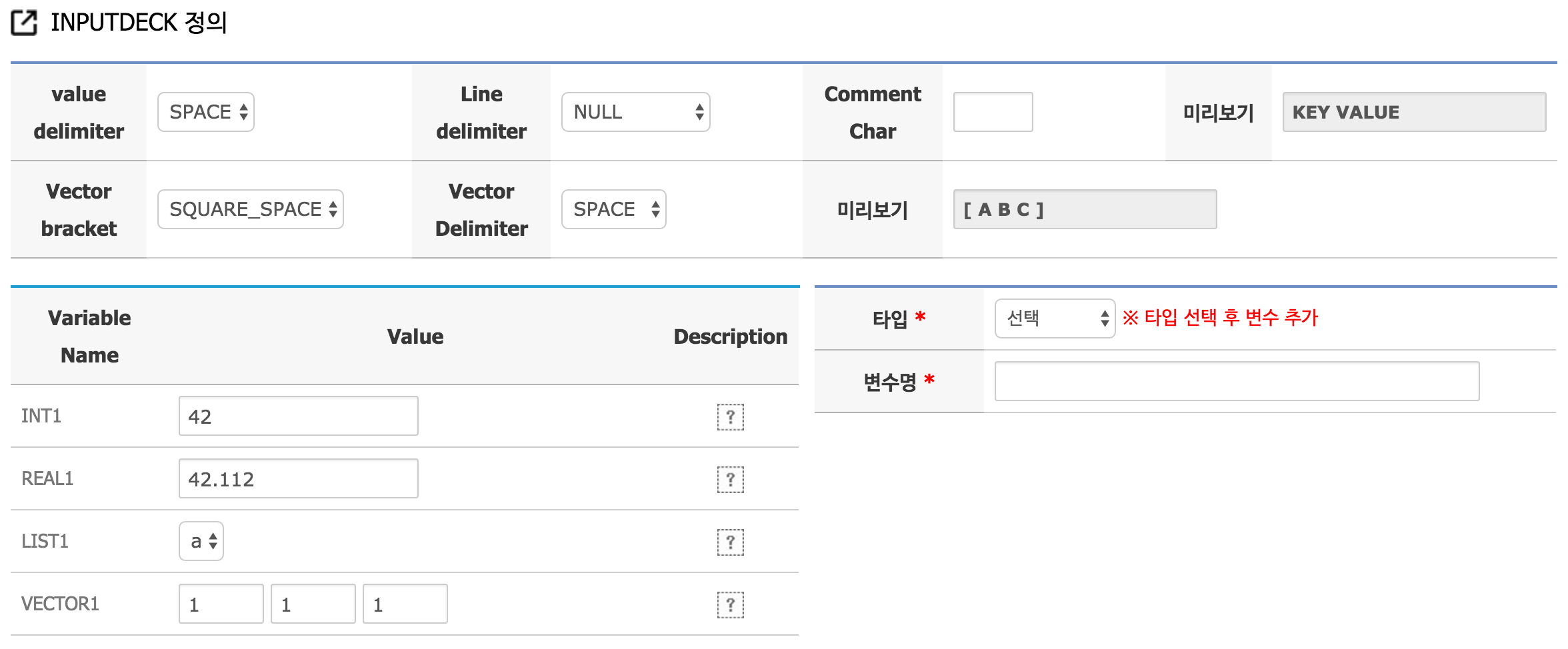C언어로 SDE에서 생성된 입력 파일을 읽는 방법을 설명하고자 합니다.
관련 문서 링크
다음과 같이 숫자형 변수 2개(정수형 변수 1개, 실수형 변수 1개), 리스트형 변수 1개, 3차원 벡터 1개를 받는 SDE를 생성했습니다.

데이터 생성 방식은 다음과 같이 설정했습니다.
| KEY | VALUE | KEY | VALUE |
|---|---|---|---|
| value delimiter | SPACE | Vector vracket | SQUARE_SPACE |
| line delimiter | NULL | Vector delimiter | SPACE |
이렇게 설정되어 생성된 입력 파일은 다음과 같습니다.
INT1 42
REAL1 42.112
LIST1 a
VECTOR1 [ 1 0 0 ]
Example
명령행 인자(Command Line Argument) 방식으로 생성된 입력 파일을 읽고 입력된 변수 값을 출력하는 예제 코드입니다.
#include <stdio.h>
#include <stdlib.h>
#include <string.h>
#include <getopt.h>
typedef struct _inputparam {
int int1;
double real1;
char list1;
int vector1[3];
} INPUT;
int main (int argc, char* argv[])
{
int opt;
FILE *fp_input ;
char buf_char[256];
INPUT input;
// Detect the end of the options.
while((opt = getopt(argc, argv, "i:")) != -1 ) {
switch(opt) {
case 'i':
if((fp_input = fopen(optarg,"r")) == NULL ) {
fprintf(stderr, "Error opening inputfile Path: %s\n", optarg);
return -1;
} else {
printf("Succeed to open inputfile Path: %s\n", optarg);
}
break;
default:
printf("Usage: %s -i [filepath] \n", argv[0]);
return -1;
}
}
while(1) {
fscanf(fp_input, "%s", buf_char);
if(feof(fp_input))
break;
if(!strcmp(buf_char, "INT1")) {
fscanf(fp_input, "%d", &input.int1);
} else if(!strcmp(buf_char, "REAL1")) {
fscanf(fp_input, "%lf", &input.real1);
} else if(!strcmp(buf_char, "LIST1")) {
fscanf(fp_input, "%s", &input.list1);
} else if(!strcmp(buf_char, "VECTOR1")) {
fscanf(fp_input, "%*s %d %d %d %*s", &input.vector1[0], &input.vector1[1], &input.vector1[2]);
} else {
printf("Error Invalid value name :: %s\n", buf_char);
exit(1);
}
}
printf("int1: %d \n", input.int1);
printf("real1: %f \n", input.real1);
printf("list1: %c \n", input.list1);
printf("vector1 = %d %d %d \n",input.vector1[0], input.vector1[1], input.vector1[2]);
fclose(fp_input);
return 0;
}
위 예제코드는 입력 파일이 1개인 경우 예제의 코드에서 SDE 파일을 읽는 부분을 추가하였습니다.
주요 코드 설명
...
[1] while(1) {
[2] fscanf(fp_input, "%s", buf_char);
[3] if(feof(fp_input))
break;
[4] if(!strcmp(buf_char, "INT1")) {
fscanf(fp_input, "%d", &input.int1);
} else if(!strcmp(buf_char, "REAL1")) {
fscanf(fp_input, "%lf", &input.real1);
} else if(!strcmp(buf_char, "LIST1")) {
fscanf(fp_input, "%s", &input.list1);
} else if(!strcmp(buf_char, "VECTOR1")) {
fscanf(fp_input, "%*s %d %d %d %*s", &input.vector1[0], &input.vector1[1], &input.vector1[2]);
[5] } else {
printf("Error Invalid value name :: %s\n", buf_char);
exit(1);
}
}
...
[1] while 문을 이용해 파일을 처음부터 끝까지 읽습니다.
[2] fscanf() 함수를 이용해 변수 이름이 저장되어 있는 하나의 문자열(첫 단어)를 buf_char에 저장합니다.
[3] feof() 함수를 이용해 파일의 끝까지 읽으면 break 문을 이용해 while문을 빠져 나오게 됩니다.
[4] 입력 파일에서 읽은 변수 이름을 확인하여 저장 합니다. 벡터 변수의 경우 변수 이름과 값 사이에 있는 [ , ] 문자를 %*s 를 사용해 읽기만 하고 따로 변수에 저장하지 않습니다.
[5] 원하지 않은 변수 값이 입력되는 경우 이에 대한 에러 메시지를 표시하고 프로그램을 종료합니다.
SDE case study 2
SDE 생성시 데이터 생성 방식을 아래와 같이 설정한다면, 생성되는 입력 파일의 모양이 약간 달라질 것입니다.
| KEY | VALUE | KEY | VALUE |
|---|---|---|---|
| value delimiter | EQUAL | Vector vracket | SQUARE_SPACE |
| line delimiter | SEMICOLON | Vector delimiter | SPACE |
생성된 입력 파일
INT1 = 42 ;
REAL1 = 42.112 ;
LIST1 = a ;
VECTOR1 = [ 1 0 0 ] ;
추가된 value delimiter와 line delimiter를 고려해 코딩을 해야 합니다. %*s 이용해 변수 이름과 변수 값 사이에 있는 =와 변수 끝에 있는 ;을 파일에서 읽기만 하고, 따로 저장하지 않는 부분을 추가하면 됩니다.
fscanf(fp_input, "%d", &input.int1); -> fscanf(fp_input, "%*s %d %*s", &input.int1);
변경전 코드
...
[4] if(!strcmp(buf_char, "INT1")) {
fscanf(fp_input, "%d", &input.int1);
} else if(!strcmp(buf_char, "REAL1")) {
fscanf(fp_input, "%lf", &input.real1);
} else if(!strcmp(buf_char, "LIST1")) {
fscanf(fp_input, "%s", &input.list1);
} else if(!strcmp(buf_char, "VECTOR1")) {
fscanf(fp_input, "%*s %d %d %d %*s", &input.vector1[0], &input.vector1[1], &input.vector1[2]);
...
변경후 코드
...
[4] if(!strcmp(buf_char, "INT1")) {
fscanf(fp_input, "%*s %d %*s", &input.int1);
} else if(!strcmp(buf_char, "REAL1")) {
fscanf(fp_input, "%*s %lf %*s", &input.real1);
} else if(!strcmp(buf_char, "LIST1")) {
fscanf(fp_input, "%*s %s %*s", &input.list1);
} else if(!strcmp(buf_char, "VECTOR1")) {
fscanf(fp_input, "%*s %*s %d %d %d %*s %*s", &input.vector1[0], &input.vector1[1], &input.vector1[2]);
...